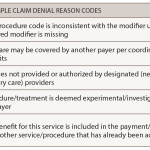It’s helpful for the clinical staff to understand the process, and one way to accomplish this is to run a revenue and usage report to see the impact of the denials management or revenue reduction or decrease.
Denials Management & the Back End
Handling claims denials and rejections is the largest function of back-end staff. Claims denials and rejections are some indicators of issues within the process, because they take on many forms. A rejection indicates that there is a problem and is sent back to the provider before hitting the payer system. Conversely, denials signify that the payer found an error with the coding. Common denials or rejections seen on the back end include, but are not limited to, inaccurate demographics, inaccurate or missing authorizations, unbundling of codes and lack of medical necessity. Although there are many reasons for a rejection or a denial, these lead to issues with a practice’s revenue cycle and its bottom line.
Common denials or rejections seen on the back end include, but are not limited to, inaccurate demographics, inaccurate or missing authorizations, unbundling of codes & lack of medical necessity.
Coders, billers and payment posters see firsthand the errors that cause the rejection or the denials and have the responsibility to share with providers and other staff. Coding experts should meet with providers and ancillary staff to share coding errors and recommendations for improvement.
Prioritization is vital to improve denials management; back-end staff can create a process or workflow to handle denials/rejections as well as to track any payer trends. It is a good idea to identify and work on high-dollar claims or the largest payer, as these tend to have the biggest influence on a practice’s bottom line and if addressed in a timely manner, can speed up cash flow. Other areas to break down denial/rejection trends for enhanced denials management include medical necessity, bundled services, coding specificity, etc.
Close the Gap
The revenue cycle management is a multifaceted area and requires everyone to play their part in addressing the practice’s needs. Below are some key points practices can use to assist with their daily business process:
- Ensure front-end staff are trained and understand the eligibility verification process, collecting co-pays up front, prior authorizations, managing referrals and the practice’s financial policy.
- Maintain current contracting and payer manual updates, especially for prior authorization, as well as payer policies and regulations.
- Strengthen denial management processes where denial outcomes are shared with all departments; focus on identifying where coding training gaps have created denials.
- Create and/or monitor clinical documentation improvement for providers to address coding guidelines for appropriate clinical information and accurate code assignment.
- Pull monthly/quarterly reports to review A/R in an effort to manage denials in a timely manner.
The healthcare revenue cycle component is active and heavily regulated, and adjustments to reimbursement in the delivery system for provider services continue to have major impacts on the financial performance of physician practice. Thus, it is imperative that the entire revenue cycle function is streamlined to be as effective and efficient as possible. All areas of the practice must work together in order to achieve the best outcome. Providers and practice managers play a key role in encouraging communication and process improvement to reduce denials and rejections, which affect the revenue cycle. Practices should provide consistent and regular training on all areas of the practice and the effect they have on the revenue cycle management.



